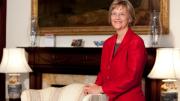President Drew Faust today disseminated her beginning-of-the-year message to the University community. She expressed hope for “another year of institutional aspiration and…intellectual adventure.” (As is her custom, she also spoke at the first Morning Prayers in Memorial Church, on September 4, and addressed the College freshmen later that day. See this earlier dispatch for links to Faust’s 2011 video message, and reports on her prior-year forums in Sanders Theatre.)
Faust’s message summarized developments during the prior year—she highlighted the Innovation Lab, the Harvard Initiative for Learning and Teaching, and the edX online learning initiative—each of which likely also ties into priorities for the forthcoming capital campaign, an area of heightened emphasis for the administration this year (see below). These initiatives, she wrote, suggest larger themes:
…an appetite to experiment with new ways of doing things—a recognition that Harvard’s most enduring tradition is a capacity for thoughtful change. They suggest a commitment to engage the larger world and to help meet its challenges in ways that a university distinctively can. And they suggest a desire to pursue ideas along pathways unblocked by barriers of discipline or professional field—to experience Harvard less as an assemblage of discrete parts and more as an encompassing and navigable whole.
Among priorities for the current academic year, she highlighted physical investments (undergraduate House renewal, Allston planning, and continuing construction on the Fogg Art Museum project and the public space by the Science Center); the continuing reorganization of the library system; and international outreach.
The Coming Campaign
Faust then turned to planning for the capital campaign, “with a public launch likely in late 2013.” This year, Faust’s sixth in office, marks an important transition. Much of the adjustment to the 2008-2009 financial crisis—with the sharp decline in the value of the endowment, and the need to adjust operating budgets and capital projects to new economic realities—is in the past. In prospect is a large University-wide fundraising campaign—the first since the $2.65-billion University Campaign concluded in 1999. The priorities chosen—the academic initiatives in which Harvard hopes to invest—will help define her contemporary imprint on the institution, and the legacy of her administration. Some of those aims are already clear, from her current message and from work undertaken in past years:
- comprehensive renovation of the undergraduate Houses, now in a test phase—ultimately, a $1-billion-plus project;
- construction of a redesigned science-research facility in Allston (work was halted in early 2010 for financial reasons), and perhaps other facilities within that area of future campus expansion;
- endowment for financial-aid commitments extended in the previous decade (as reported, the Faculty of Arts and Sciences now finds its unrestricted funds under pressure as it meets needs for the expanded financial-aid initiative, in the wake of reduced endowment distributions);
- the arts and creativity, as outlined by Faust’s arts task force, whose report outlined a stimulating future—academic programs in film, drama, creative writing, and undergraduate art-making (see examples of students’ work here), as well as expanded faculty ranks and facilities—but unfortunately arrived at the absolute depths of the financial crisis, causing its goals to be deferred, for the most part;
- engineering and applied sciences, reflecting the ambitious plans of the School of Engineering and Applied Sciences (which will surely require new facilities to accommodate an expanded faculty), in addition to initiatives in fields ranging from bioengineering to stem-cell science to systems biology and the related support for entrepreneurship generally, as symbolized by the Harvard Innovation Lab (see the link above); and
- learning, teaching, and pedagogy (already benefiting from the HILT initiative).
Yet to be filled in are the University’s international aims and strategies; specific program goals in areas of potential Harvard strength such as energy and the environment, and in the humanities and social-sciences generally; and the priorities of the various professional schools, all of which will be part of a coordinated Harvard campaign for the first time. (The law and business schools have in recent decades conducted separate capital campaigns.)
The details will come in due time, Faust suggested, but toward the end of her letter, she sought to put specific initiatives into a broader perspective:
We should measure our progress by how, over time, we shape and contribute to human understanding in its fullest sense, how we attend not only to the immediate but to the timeless. New programs, new modes of teaching, new buildings, and new appointments are not ends in themselves. They ultimately matter insofar as they advance our enduring academic purposes—to educate students to lead lives of meaning and value, to better fathom the world we inhabit, to conserve and interpret the knowledge of generations, to marry rigor and imagination in the pursuit of new ideas, to serve society in ways a community of learning singularly can.









